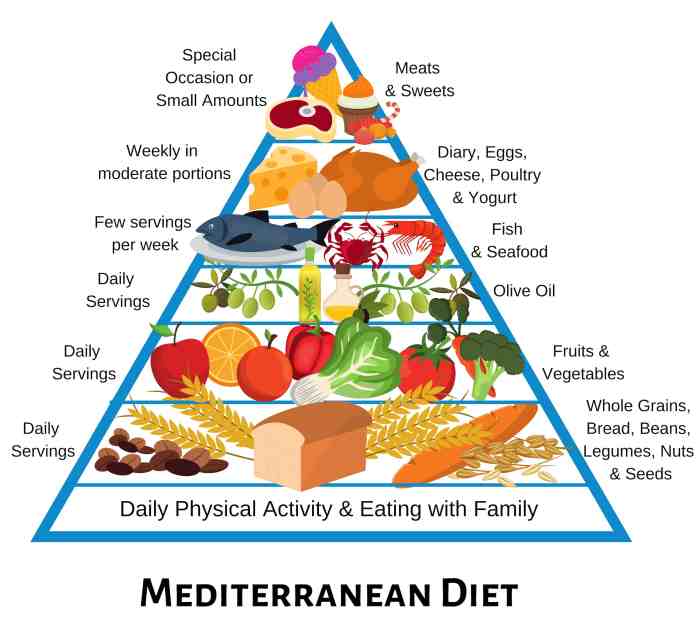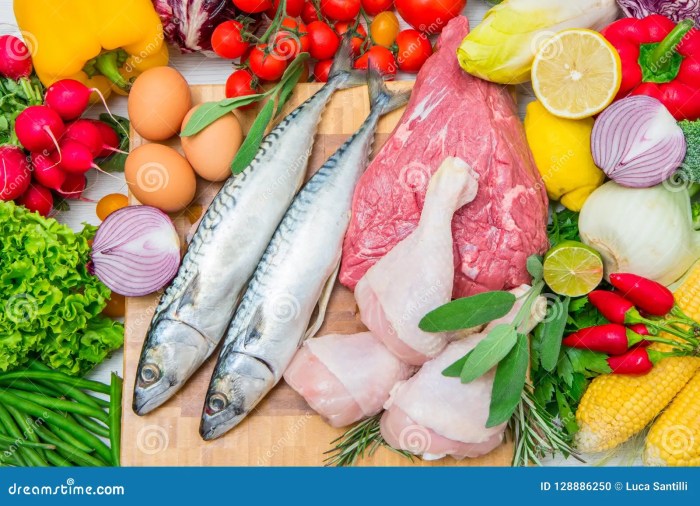What is a pescetarian? A pescetarian is someone who follows a vegetarian diet that includes fish and other seafood. This diet is often seen as a middle ground between vegetarianism and meat-eating, and it offers a number of potential health and environmental benefits.
Pescetarians typically eat a variety of plant-based foods, including fruits, vegetables, whole grains, and legumes. They also eat fish and other seafood, which are good sources of protein, omega-3 fatty acids, and other essential nutrients.
Definition of Pescetarianism
Pescetarianism is a dietary practice that involves consuming seafood along with plant-based foods, while excluding meat and poultry. The term “pescetarian” is derived from the Italian word “pesce,” meaning “fish,” and the suffix “-arian,” denoting a person who follows a particular diet.
Pescetarians typically include fish, shellfish, and other forms of seafood in their diet, along with fruits, vegetables, whole grains, legumes, nuts, and seeds. They abstain from consuming meat from land animals, such as beef, pork, chicken, and turkey.
Differentiating Pescetarianism from Other Vegetarian Diets
Pescetarianism differs from other vegetarian diets, such as lacto-vegetarianism and veganism, in that it allows for the consumption of seafood. Lacto-vegetarians include dairy products in their diet, while vegans exclude all animal products, including meat, poultry, fish, dairy, and eggs.
Health Benefits of a Pescetarian Diet
Pescetarianism offers numerous potential health benefits, as evidenced by various studies and research. This diet, which includes fish and seafood while excluding other types of meat, provides a rich source of essential nutrients that contribute to overall well-being.
One of the key benefits of a pescetarian diet is its association with reduced risk of cardiovascular disease. Fish and seafood are rich in omega-3 fatty acids, which have anti-inflammatory properties and have been shown to lower blood pressure, improve cholesterol levels, and reduce the risk of blood clots.
Additionally, pescetarians tend to consume more fruits, vegetables, and whole grains, which further contribute to heart health.
Nutritional Value of Fish and Seafood
Fish and seafood are excellent sources of protein, vitamins, and minerals. They are particularly rich in omega-3 fatty acids, which are essential for brain health, heart health, and immune function. Fish and seafood also provide essential vitamins such as vitamin D, vitamin B12, and selenium, as well as minerals like iron, zinc, and iodine.
Indulge in the healthy pescetarian diet , a nourishing plan that embraces the best of both worlds. By incorporating fish and seafood into a plant-based foundation, you’ll enjoy a plethora of omega-3 fatty acids, essential vitamins, and minerals while reducing your environmental impact.
By incorporating fish and seafood into their diet, pescetarians can reap the benefits of these essential nutrients, which contribute to overall health and well-being.
Environmental Considerations

Adopting a pescetarian diet has notable environmental implications compared to other dietary choices. Understanding the impact of our food choices on the planet is crucial for promoting sustainable eating practices.
One significant advantage of a pescetarian diet is its lower carbon footprint compared to meat-based diets. Seafood production typically emits less greenhouse gases than livestock farming, contributing to climate change mitigation. Fish and shellfish have a lower feed conversion ratio, meaning they require less feed to produce the same amount of protein as terrestrial animals.
Sustainability of Seafood Consumption
While seafood consumption offers environmental benefits, it’s essential to consider the sustainability of fishing practices. Overfishing, habitat destruction, and pollution pose threats to marine ecosystems. Choosing seafood from sustainable sources is crucial to preserve biodiversity and maintain healthy fish populations.
- Overfishing:Excessive fishing can deplete fish stocks, disrupting marine ecosystems and threatening species survival.
- Habitat Destruction:Destructive fishing practices, such as bottom trawling, can damage critical marine habitats, including coral reefs and seagrass beds.
- Pollution:Industrial activities, such as oil spills and plastic waste, can contaminate marine environments, harming fish and other marine life.
Ethical Concerns
In addition to environmental considerations, ethical concerns related to fish farming and fishing practices are also relevant for pescetarians.
- Fish Farming:Intensive fish farming practices can raise concerns about animal welfare, including overcrowding, disease, and the use of antibiotics.
- Bycatch:Non-target species, such as dolphins and sea turtles, can be unintentionally caught and harmed in fishing operations.
Meal Planning for Pescetarians

Meal planning as a pescetarian involves incorporating a variety of seafood, plant-based foods, and whole grains into your diet. Here’s a sample meal plan to provide you with ideas and inspiration:
Breakfast
- Oatmeal with berries, nuts, and a drizzle of honey
- Scrambled eggs with smoked salmon and whole-wheat toast
- Greek yogurt with fruit and granola
Lunch
- Salad with grilled tuna, mixed greens, vegetables, and a light vinaigrette
- Lentil soup with a side of whole-wheat bread
- Sandwich on whole-wheat bread with hummus, avocado, and sprouts
Dinner
- Grilled salmon with roasted vegetables and quinoa
- Vegetarian chili with cornbread
- Pasta with seafood, such as shrimp or mussels, in a tomato-based sauce
Snacks
- Apple with peanut butter
- Trail mix with nuts, seeds, and dried fruit
- Hummus with vegetable sticks
Challenges and Considerations: What Is A Pescetarian
Adopting a pescetarian diet comes with potential challenges and considerations that require careful attention to ensure a balanced and healthy lifestyle.
One of the primary challenges lies in ensuring adequate intake of certain nutrients that are typically obtained from animal sources. These include vitamin B12, iron, zinc, and omega-3 fatty acids.
Overcoming Nutrient Deficiencies, What is a pescetarian
To overcome nutrient deficiencies, pescetarians should incorporate a variety of foods into their diet that are rich in these essential nutrients. For example, vitamin B12 is found in fish, shellfish, and fortified foods like nutritional yeast and plant-based milks. Iron can be obtained from beans, lentils, tofu, and leafy green vegetables.
Zinc is present in nuts, seeds, legumes, and whole grains. Omega-3 fatty acids can be found in fatty fish like salmon, tuna, and mackerel, as well as in algae-based supplements.
If you’re looking for a nutritious and sustainable way to eat, a healthy pescetarian diet might be the perfect choice for you. This diet emphasizes plant-based foods, including fruits, vegetables, whole grains, and legumes, while also allowing for the consumption of seafood.
In addition to dietary modifications, pescetarians may consider consulting with a healthcare professional to assess their nutrient levels and determine if supplementation is necessary.
Addressing Social Stigma
Another challenge faced by pescetarians is potential social stigma or misunderstandings surrounding their dietary choices. Some individuals may not be familiar with the pescetarian diet or may hold misconceptions about its nutritional adequacy.
To address social stigma, pescetarians can educate others about their dietary choices and emphasize the health benefits associated with consuming fish while reducing meat intake. They can also seek support from online communities or local groups of like-minded individuals.
Importance of Consulting Healthcare Professionals
Consulting with healthcare professionals is crucial for pescetarians to ensure they are meeting their individual nutritional needs. A doctor or registered dietitian can provide personalized guidance on nutrient intake, supplementation, and overall dietary balance.
Regular check-ups and blood tests can help monitor nutrient levels and identify any potential deficiencies that require attention. Healthcare professionals can also provide support and motivation, helping pescetarians stay on track with their dietary goals.
Last Word

Overall, the pescetarian diet is a healthy and sustainable way to eat. It offers a number of potential health benefits, including reduced risk of heart disease, stroke, and certain types of cancer. It is also a relatively easy diet to follow, and it can be adapted to meet the needs of most people.
User Queries
What are the health benefits of a pescetarian diet?
A pescetarian diet has been linked to a number of health benefits, including reduced risk of heart disease, stroke, and certain types of cancer. Fish and other seafood are good sources of protein, omega-3 fatty acids, and other essential nutrients that are important for overall health.
Is a pescetarian diet more sustainable than a meat-eating diet?
Yes, a pescetarian diet is generally considered to be more sustainable than a meat-eating diet. Fish and other seafood have a lower environmental impact than meat, and they are a more efficient source of protein.
Is it difficult to follow a pescetarian diet?
No, a pescetarian diet is relatively easy to follow. There are many plant-based foods that can be included in a pescetarian diet, and there are also a variety of fish and other seafood that can be eaten.